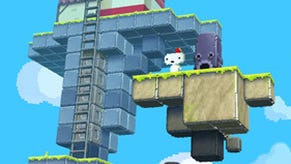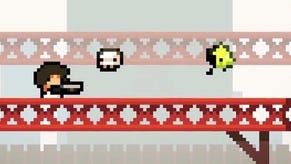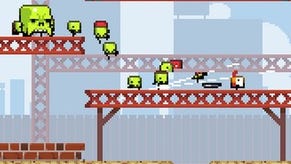Super Crate Box dev calls for action on game cloning
Vlambeer warns copycats are killing the industry.
The studio behind hit indie platformer Super Crate Box has called for an industry wide effort to kill off game cloning.
Speaking at GDC in San Francisco earlier today, Vlambeer's Rami Ismail and Jan Nijman, whose 2010 effort Radical Fishing was allegedly cloned by Gamenauts as Ninja Fishing, warned that copycats are slowly eroding true creativity and innovation in the industry.
"Cloning stagnates the industry," insisted Nijman.
"We're losing a lot of skilled people which is a double edged sword. There are really good programmers working on soulless clones with no creativity that offer nothing to the industry.
"And on the other hand there are a lot of skilled people making games, then getting cloned, losing money, going bankrupt and then no longer making games. We don't want that for our industry."
He added that cynical facsimiles of original titles are causing gamers to "lose faith in the medium".
"If the only games people play are s***** games they will think games are boring.
"The players will get all these bad games and stop recognising good games. If you only eat bad hamburgers, you'll stop being able to recognise good hamburgers. Clones stagnate the industry by lowering expectations and standards. We have a huge responsibility to educate and help our players."
So, what's the solution? Ismail argued that attempting to take down cloners head on is a waste of time - "we can't, it's too big".
Instead he urged indie developers to make clones "irrelevant" by educating players about how games are made and building an emotional attachment with their audience.
"What we should do is make it irrelevant. We should try to approach this from a more constructive angle. We should try to make what we do more relevant.
"We do that by improving literacy, to build a foundation for originality. People don't realise games are made by people. We should be helping to fix that. The first thing is offering insight into the process. We show people what we do, what we go through, all the things we do, all the s*** that happens."
Ismail noted that many developers and industry figures have already picked up the torch, citing Indie Game: The Movie as an example.
"That will improve cultural literacy a lot. We have people like [Canabalt creator] Adam Saltsman and Markus Persson talking about design in depth and really explaining what they're doing and why they're making choices," he continued.
"Show people what you're doing. Show it in a video, be personal."
He urged indies not to hide their projects away until just before launch out of fear of being copied.
"That's the opposite of what we should be doing. We shouldn't just drop the product on the market and go 'here, buy it'. We should be telling people this is a struggle, we worked for this for months, we've had hardships. We should be talking about this sort of thing. Spread the word."
Cloning has been a hot button topic in the industry in recent months, with social gaming giant Zynga recently accused of thieving the basic concept of resource management hit Tiny Tower for one of its own releases.




